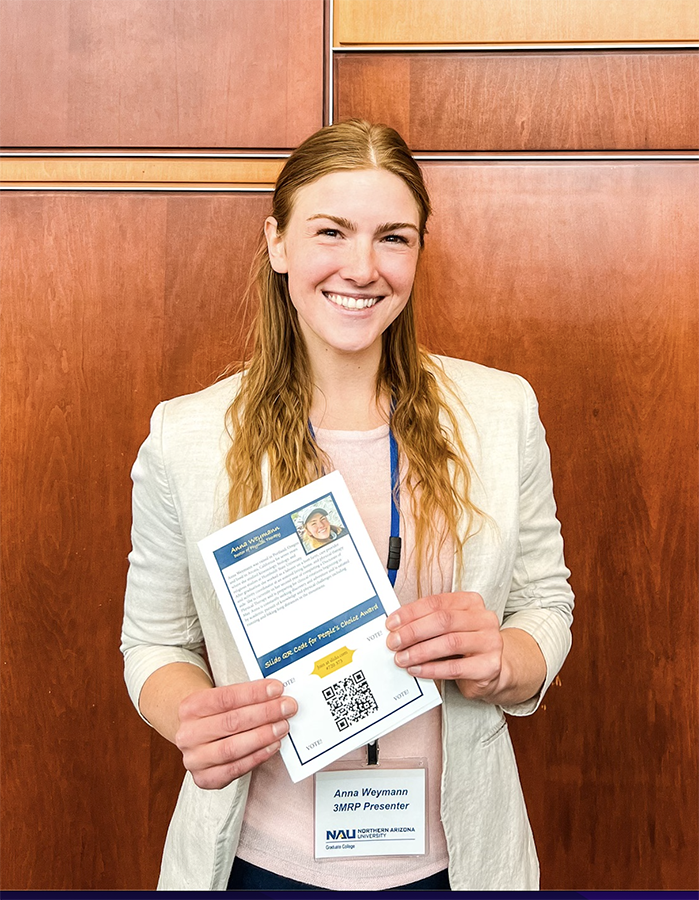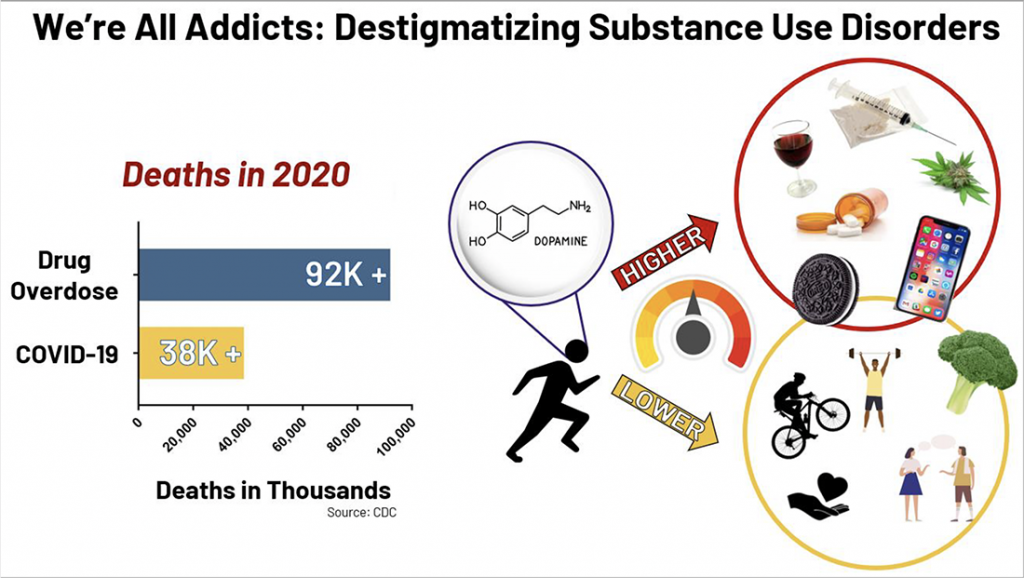How do you catch people’s attention, describe your research question and methodology and explain the significance of your findings, all while using plain language and doing it all in just three minutes and with one slide?
Well, you might start with this sentence: “We are in a pandemic, but not the one you’re thinking of.”
Physical therapy doctoral student Anna Weymann used a dozen words to powerfully introduce her doctoral research: how movement-based neurological rehabilitation can help retrain addicted brains. Given how widespread addiction is—in 2020, the number of overdose deaths in the United States more than doubled the number of COVID-19 deaths—understanding better ways to treat this condition has never been more critical.
“This is a crucial area of education and research that needs all medical specialties contributing to solutions,” said Weymann, who is part of NAU’s Culturally Centered Addictions and Research Training program (C-CART). “My hope is that this hypothesis can support rehabilitation for both substance use disorders and behavioral addictions that are increasingly abundant in our society.

NAU’s competition, which included a Graduate School Government Poster Symposium, took place Thursday at the High Country Conference Center with 11 grad students in a variety of programs presenting. Provost Karen Pugliesi said the 3MRP finals were the highlight of the academic year for her.
“This is a celebration of the research and contributions of our graduate students,” she said. “Importantly, it’s a recognition of the talent that we have the privilege to host as part of our university.”
Weymann’s research, which also netted her a People’s Choice Award, stems from a lifelong interest in what drives human behavior and the dopamine system. It is focused on making connections and developing hypotheses based on the limited available research on movement interventions.
“What I wanted to convey in my 3MRP is that the impact of addiction is seen in our behaviors every day, and behaviors that are health-reducing impact motivation for other activities that are potentially more health-promoting,” she said. “Some common potentially health-reducing behaviors, which stimulate the same pathways as substance use disorders, are excessive internet, video game and cell phone use, as well as lifestyle choices such as diets high in processed sugar. Understanding the neurobiology of addiction and how to rehabilitate the brain is a keystone to supporting the health of our society.”
In continuing this research, Weymann’s hope is to collaborate with other C-CART scholars and a local organization that supports people who are overcoming substance abuse disorders to determine what needs exist in this population and if people would be open to movement-based interventions.
The judges were: Sharon Singer Doctor, director of student life experience in Indigenous Student Success; John Doherty; head of teaching, learning and research services in Cline Library; Mahendra Joshi, MBA graduate coordinator in The W. A. Franke College of Business; General Counsel Michelle Parker; Egbert Schwartz, professor of biological sciences; Gina Kaiser Vance, associate vice provost of NAU Online; and Jessica Wood, associate chair of the Department of Global Languages and Cultures.
Presenters
Layla Alden, Ph.D. in curriculum and instruction, College of Education
Project: 1,000 years strong!
Kylee Austin, doctor of physical therapy, College of Health and Human Services
Project: Like, Love, Post, and Repost: The Role of Social Media in Building Diversity in University Enrollment
Betsy Black, master’s in biology, College of Forestry and Natural Sciences
Project: What does a change in the composition of boreal forests mean for the destiny of the carbon they store?
Tiantian Feng, Ph.D. in curriculum and instruction, College of Education
Project: Using Literature Circles to Enhance Teaching of English as a Foreign Language (EFL)—A Pilot Study with Chinese Pre-service Teachers
Whitney Holeva-Eklund, Ph.D. in interdisciplinary health, College of Health and Human Services
Project: Species Distribution Modeling of Aedes aegypti in Maricopa County, Arizona from 2014-2020: Toward Better Preparedness for Dengue, Yellow Fever, Chikungunya, and Zika
Elli Morris, master’s in forestry, College of Forestry and Natural Sciences
Project: Who gives a crap? Hikers do, that’s who!
Rebecca Seeger, Ph.D. in curriculum and instruction, College of Education
Project: College-in-Prison Programs: Face-to-Face or Correspondence—Does it Matter?
Natalie Papini, Ph.D. in interdisciplinary health, College of Health and Human Services
Project: Self-Compassion and Body Image in Pregnancy and Postpartum: A Randomized Controlled Trial of a Brief Self-Compassion Meditation Intervention
Candi Running Bear, Ph.D. in curriculum and instruction, College of Education
Project: A Comparison of the Engagement of Native American Preschoolers with Disabilities When Using General Picture Books, Culturally Relevant Picture Books, and Squishy Books
Isabel Tíclo, doctor of physical therapy, College of Health and Human Services
Project: Analyzing Racial Disparities in Stroke Severity During America’s Most Diverse Era
Anna Weymann, doctor of physical therapy, College of Health and Human Services
Project: We’re All Addicts: Destigmatizing Substance Use Disorders
Winners
First place: Anna Weymann
Second place: Whitney Holeva-Eklund
Third place (tie): Natalie Papini and Candi Running Bear
People’s Choice Awards (tie): Tiantian Chen and Anna Weymann



